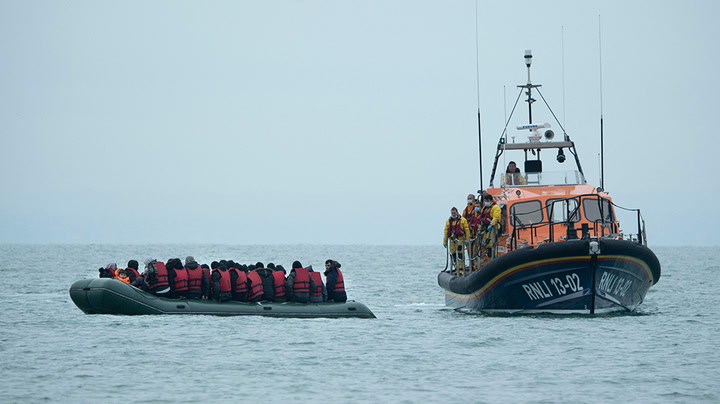Hunting ‘The Scorpion’: My Mission to Track Down the Gangs Smuggling Migrants Across the Channel
Hunting ‘The Scorpion’: My mission to track down the gangs smuggling migrants across the Channel
This week Yvette Cooper pledged to go after the criminals behind the thousands of migrants who cross the Channel every year. She won’t find it easy and will be shocked by what she discovers, says Sue Mitchell, whose leads took her to corner shops in Nottingham and affluent suburbs in Belgium in her year tracking down some of Interpol’s most-wanted
As 2024 began my colleague Rob Lawrie and I set out on a secret mission. I’m an investigative journalist, Rob’s an ex-soldier, now an aid worker, and we have combined our talents in the past, working on immigration stories. Together, we had tracked and traced families, some with tiny children, across Europe and spent time in the French camps as they prepared to reach Britain.
There have been more than 50 deaths so far this year, but it has done nothing to stem the numbers attempting this perilous journey: the running total for 2024 is up 16 per cent to almost 32,000 compared with the same point last year.
At the Interpol General Assembly in Glasgow this week, Keir Starmer announced more money for this issue and revealed new agreements with countries in the western Balkans, particularly focusing on sharing intelligence.
The home secretary, Yvette Cooper, says it will take time to get investigators and new technology in place, but has pledged to “go after the criminal gangs at the heart of this”.
The challenge the government faces is enormous, as we discovered this year when we set out to track down and expose the smugglers themselves. The people who organise the operations, commission the boats and promise entry to the UK via rubber dinghy.
We had one target in mind: a man on the Interpol most wanted list who is known to have brought thousands of people across Europe into Britain.
His name is Barzan Majeed, but he is known as “The Scorpion”. Majeed is 38 and an Iraqi Kurd. He’s also tough and fleet of foot. When an international police surveillance operation caught 25 members of his gang, he was tipped off and disappeared. When we started to look for him, there were few clues.
Rob and I got going by asking questions of our contacts in the camps. People were scared and either told us they knew nothing, or warned us off. One man told us that the smugglers are armed and would do whatever was necessary to protect their trade: “I’m not scared of anyone, but these guys, yeah, they will put a bullet in your back.”
People smuggling using small, inflatable boats began in earnest in 2019 when the surveillance of lorries arriving in the UK was tightened. Back then, Rob and I met a little girl called Marianne who almost died when one of those first dinghies sank in the English Channel.
There were 19 people on board the rubber boat and not one lifejacket. Benzine from the outboard engine had mixed with the seawater and become corrosive. Marianne and her mother showed us the livid scars from the burns they suffered. And young though she was, Marianne knew she almost didn’t make it: “I was scared, this was so scary. I was so cold it made me want to die.”
The terrified child and dangerous dinghy were the first links in a chain that would eventually lead us through the ranks of a criminal gang to the man at the very top – The Scorpion.
When police in the UK pick up migrants, they take and inspect their mobile phones. The Scorpion’s number was found in thousands of them – he uses a picture of a scorpion when he sends out messages on WhatsApp.
Martin Clarke, a senior investigating officer at the National Crime Agency, told us how significant that image was: “Some of these crime gangs like to use an alias to gather kudos. We were seeing an avatar of a scorpion over and over and the more we looked, the more Majeed started to feature. You begin to realise that he’s a very significant individual.”
The officers at the NCA helped us by sharing some of what they knew about Majeed. They showed us his immigration record and we were astonished to learn that he had lived in the UK for almost a decade. He was smuggled in, in the back of a lorry, in 2006 aged 26.
He used a false name and claimed to be an asylum seeker fleeing persecution in Iran. His records say he was refused leave to remain after a year, but no one made him leave, even though he was in and out of prison for handling firearms and taking and dealing drugs. British authorities only discovered his true nationality when he slipped up, using a prison phone to make a call to his mother – the number he had dialled was in Iraq.
On the brink of being deported, The Scorpion agreed to voluntarily leave the UK and return to Iraq. This was in 2015 – just as millions of people, displaced by wars, were trying to make their way to Europe from Iraq, Syria, Afghanistan, Somalia and Eritrea. —>READ MORE HERE







Comments are closed.